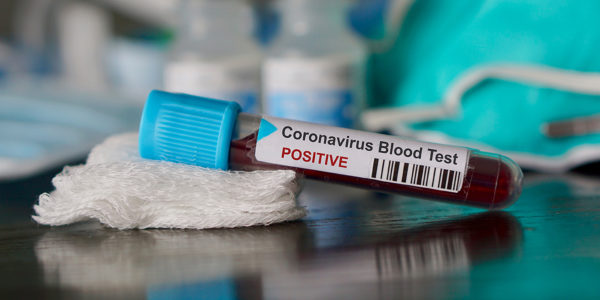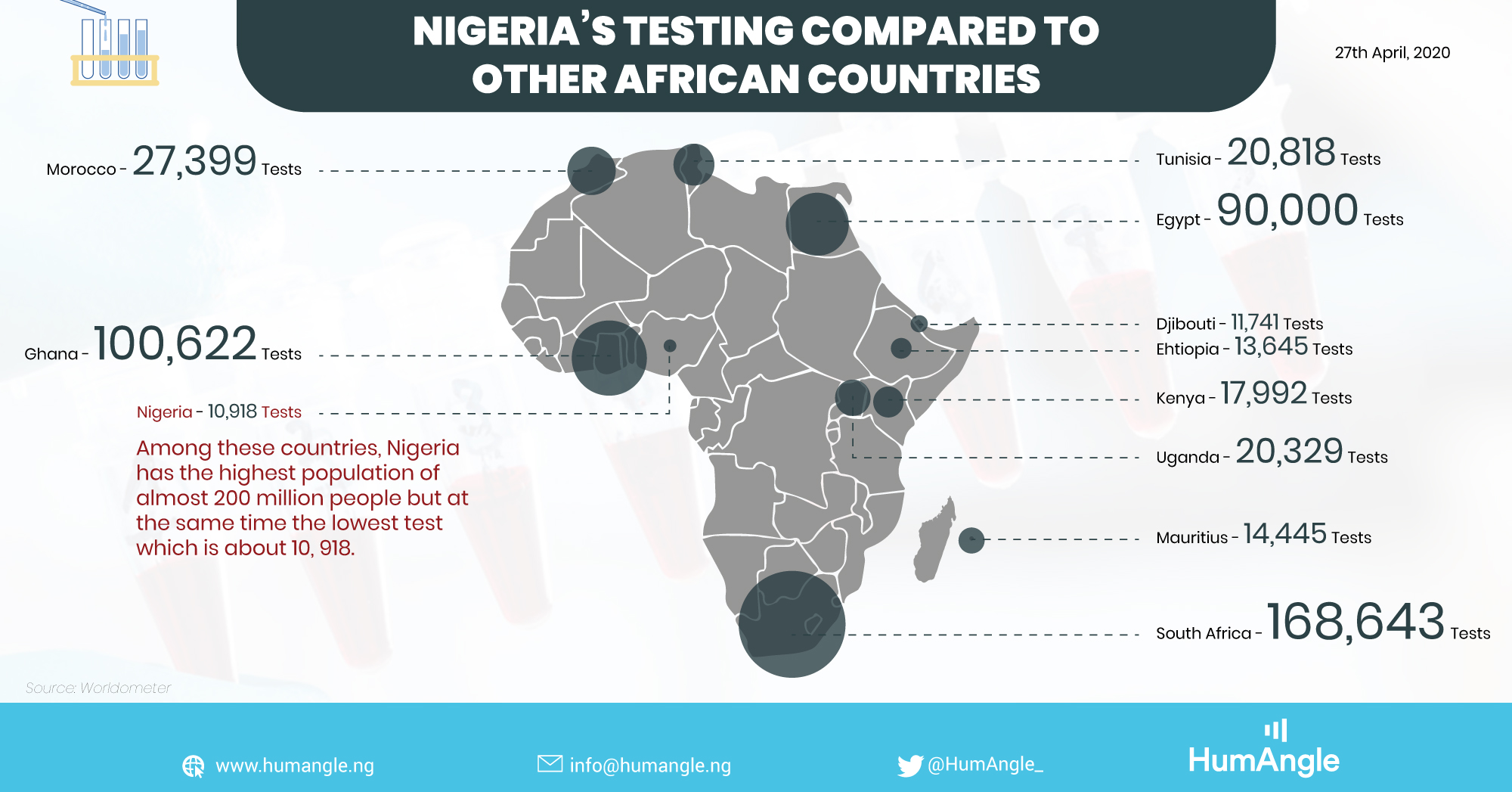COVID-19 Lockdown: End Still Bleak As Nigeria Slacks On Testing

Nigerians have begun to express apprehension over the low testing rates for COVID-19 by the government despite the almost four-week lockdown period.
Many feel the testing slack might mean an extension of the lockdown and further crippling of the economy.
They said that the lockdown had not been properly utilised by the government to find those infected with the novel coronavirus.
So far, Nigeria has tested about 10, 918 people in a population of almost 200 million, meaning that Nigeria Centre for Disease Control (NCDC) has tested 53 people per one million population.
When President Muhammadu Buhari announced the first 14 days lockdown in Lagos and Ogun states as well as the Federal Capital Territory, Abuja, on March 29, the virus had infected 111 individuals and caused one death.
“All citizens in these areas are to stay in their homes. Travel to or from other states should be postponed. All businesses and offices within these locations should be fully closed during this period,” Buhari said in an address to the nation.
At the time of the lockdown, NCDC sought to trace about 9, 000 persons of interest who had either returned from a foreign trip or had contact with such returnees.
On April 14, Dr Osagie Ehanire, the Minister of Health, said 99 per cent of the contacts had been traced.
“We have made significant progress in contact tracing and have to date, followed up 9,029 persons of interest, 99 per cent of whom have exceeded their 14-day observation period,” he said.
On the eve of the end of initial lockdown period on April 13, the president announced an extension of the lockdown for anther 14 days.
He said the extension was to further check the spread of COVID-19 which had infected 323 people in Nigeria and caused 10 deaths as at April 12.
The minister said Nigeria was processing 1,500 COVID-19 tests per day by April 12 but the numbers do not add up.
Going by the minister’s statement, Nigeria ought to have tested 11, 500 in 10 days at least but the country crossed 10, 000 on April 24.
Some Nigerians said it was based on the assumption that the testing capacities had increased that they had remained calm since the second lockdown period.
Ayo Sogunro, a lawyer, asked, “What has Nigeria actually done with its lockdown? Are we simply waiting for the virus to go?
He said, “Lockdowns are meant to slow the spread while governments prepare adequate hospital facilities and emergency provisions, test and isolate all open cases and engage in an economic recovery plan.”
Christie Adekoya, a microbiologist, said he doubted that Lagosians would comply with another lockdown extension since resources for upkeep had been depleted.
“Before you know, it will be extended. Extension with no action. I bet Lagosians will not comply this time,” she said.
Experts say that data from testing help countries understand ways to reopen the society to avoid overwhelming the health sector.
In an interview, Kayode Fayemi, the governor of Ekiti State acknowledged the importance of increased testing to “gather enough data to formulate efficient gateway to exit lockdown”.
Nedu Okeke, on Twitter, said, “Nigeria must ramp up its testing capacity before easing lockdown.”
Nigeria’s testing compared to other African countries
Across Africa, several countries have ramped up testing. Uganda has tested 20,329 people, which is 444 people per one million population.
Ethiopia has conducted over 13,645 tests. Mauritius has tested 14, 445 and Kenya, 17, 992.
Tunisia has conducted 20,818 tests and Djibouti, 11, 741 tests. South Africa leads the pack with 168,643 tests. Morocco, 27,399 tests; Egypt, 90, 000 tests and Ghana, 100,622 tests.
Senegal has developed a one dollar testing kit that can detect the virus. The government is testing everyone possible.

Why mass testing is important in the COVID-19 fight
The World Health Organisation (WHO) has continued to advocate mass testing as one of the key measures to curb the spread of the virus. The WHO Director-General, Tedros Ghebreyesus, re-echoed that recommendation in March.
“We have a simple message for all countries: test, test, test. Test every suspected case.
“If they test positive, isolate them and find out who they have been in close contact with up to two days before they developed symptoms, and test those people too,” the WHO boss said.
Lockdown extension or the Ghana example?
Ghana has become the first African country to ease its nearly three-week-old lockdown against the novel coronavirus pandemic.
While large gatherings are still banned and schools remain closed, some nonessential businesses were allowed to open in Accra and Kumasi, the two main metropolitan areas in the country.
Ghana’s President Nana Akufo-Addo said his decision came about after increasing the country’s capacity to fight the pandemic, including aggressive contact tracing and expansion of testing.
Ghana is using a unique approach to reduce the amount of time it takes to get COVID-19 test samples from remote rural areas to labs – drones.
Instead of waiting for days for a batch of samples to be transported by truck, tests from rural areas can be delivered for analysis in less than an hour.
The Ministry of Health expanded its partnership with Zipline, an American company that uses drones to deliver medical supplies.
Zipline has set up a system to deliver samples collected in more than 1,000 health facilities across the country. Zipline’s drones are automated, but they’re also being monitored, and when needed, controlled by humans.
On April 17, on Zipline’s first flight, 51 samples were flown from the Omenako drone distribution centre to the Noguchi Memorial Institute for Medical Research in Accra, 45 miles away, in what could be the first time that drones have been used to deliver COVID-19 test samples.
The COVID-19 test samples are packed in special red boxes using guidelines issued by the WHO and then placed inside the belly of the drone. The drone is then put on a launcher and it takes off to its destination for delivery.
In a televised address, Akufo-Addo said the decision did not mean the government was letting its guard down, adding existing bans on public gatherings and school closure were still in place.
He urged Ghanaians to wear masks when going outside and to continue adhering to social distancing measures in public places.
Ghana has confirmed 1,550 cases and 11 people have died, according to Ghana’s Disease Surveillance Department.
What the Nigerian government is saying
Dr Chikwe Ihekweazu, Director-General of NCDC, said that authorities had adopted a strategy of “managed acceleration” with the intention to pool samples to multiply testing capacity as was being done in Ghana, which had rolled out one of the largest testing programmes in Africa.
“I would rather go a little bit slower and get it right than speed into a situation that we will end up regretting,” he said during a briefing by WHO on Thursday, April 23.
The national pandemic response is based on a mix of the CDC’s guidelines and an existing influenza outbreak preparedness plan that will be turned into a single document, according to Dr Sani Aliyu, the National Coordinator of the Presidential Task Force on COVID-19.
Nigeria had about 350 ventilators before the coronavirus outbreak, not all of them functional, and obtained at least 100 more in recent weeks, Aliyu said.
Still, the government is struggling to import the kits needed to enable existing tuberculosis and Human Immunodeficiency Virus centres to test for the coronavirus due to a global supply crisis, said Ihekweazu.
“Once we have these in, we will be able to quickly scale up testing across the country,” Ihekweazu said.
The lockdown has kept more than 40-million people at home since March 30 and discontent is mounting in Nigeria, which, in late February, became the first Sub-Saharan African country to identify a person with the virus.
In Nigeria, 1,273 infections have been reported, including 40 health workers, and 40 people have died as of Monday morning.
Support Our Journalism
There are millions of ordinary people affected by conflict in Africa whose stories are missing in the mainstream media. HumAngle is determined to tell those challenging and under-reported stories, hoping that the people impacted by these conflicts will find the safety and security they deserve.
To ensure that we continue to provide public service coverage, we have a small favour to ask you. We want you to be part of our journalistic endeavour by contributing a token to us.
Your donation will further promote a robust, free, and independent media.
Donate HereStay Closer To The Stories That Matter




